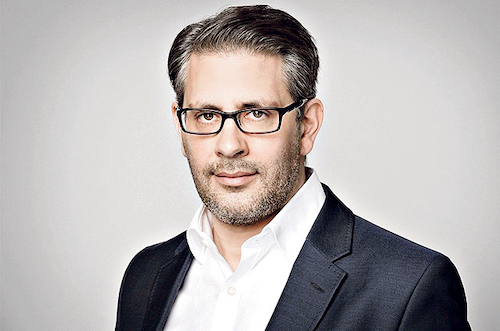The BBC is not institutionally antisemitic but there are “pockets of ignorance” at the Corporation, Panorama presenter John Ware has insisted.
Appearing as a guest on Roger Bolton’s Beeb Watch podcast, Ware, who writes regularly for Jewish News, said he took issue with former BBC director of television Danny Cohen’s insistence that the network was institutionally hostile to Israel and antisemitic with its output.
Ware also argues that the BBC’s coverage of the current Gaza conflict is “quite timid” given what is taking place in the region, adding: “Panorama should be all over Gaza… it should be all over what’s going on in Israel as well.”
Asked by former BBC presenter Bolton about how he would respond to ex-chief Cohen’s repeated claims of antisemitism within the Corporation, Ware said: “Danny’s wrong. The BBC is not institutionally antisemitic. There are certainly pockets of ignorance.
“Certainly, BBC Arabic has had a consistent run of problems. Presenters doing one thing and then on their social media doing another. That’s not acceptable for any BBC employee, obviously. And there have been mistakes with BBC News as well, and also on BBC Two, most recently this Gaza documentary. I mean, what went on there?”
John Ware.
Addressing the BBC’s handling of the recent Gaza documentary: Gaza: How to Survive a Warzone, which was pulled from iPlayer after it emerged its young narrator was the son of a Hamas official, Ware said: “It just beggars belief, frankly… There were just so many red flags… It’s not that you couldn’t do a programme about Gaza—it’s essential there are programmes, plural—but how that got through in how it did beggars belief, but it’s had a really constraining consequence.”
Ware suggested part of the problem had been that most of the BBC’s reporting from Gaza had been “reactive” and that there had been a sense of “don’t go there, don’t go there” to provide original and exclusive journalism, unlike that emerging from some of the American networks who he said had “important things to say on both sides of the conflict.”
“Danny Cohen will not approve of what I’m about to say, said Ware, before adding; “The BBC coverage actually is quite timid, given what is going on in Gaza.
“You know, Panorama should be all over what’s going on in Israel as well. But you get a sense, I may be wrong, I may be outside the BBC, that there’s a kind of, ‘don’t go there’. So most of the BBC reporting on the conflict has been reactive. I see little original journalism coming out of this conflict. ”

Danny Cohen
Ware was a reporter on the BBC public affairs documentary programme Panorama from 1986. He left the Corporation in 2012, but has continued to works as a freelance reporter for them. In 2019, his Is Labour Antisemitic? Panorama documentary exposed Jeremy Corbyn’s failure on the issue when he was leader.
Speaking on the latest edition of former BBC presenter Bolton’s podcast Ware claimed broadcasters, including the BBC, would be wise to look into the Palestinian Authority’s own poor record in cracking down on hate speech and antisemitism.
“What we haven’t had anything, – as far as I can see — any programme has spent any time in the Palestinian Authority, looking at, for example, the official outlets, which almost daily spew out the most revolting antisemitic tropes. It is institutionalised there — the corruption and so on,” he said.
“So, the idea that but for settlements, but for IDF excesses and so on and so forth, there could be a settlement tomorrow — I think is simply wrong.
“And I think, you know, broadcasters — the BBC included, especially the BBC, I would say — have not spent anything like enough time over the last two decades looking at the Palestinian Authority and Palestinian rejectionism.
“You know, broadcasters spend an awful lot of time looking at Israeli rejectionism — fair enough — and no time at all looking at Palestinian rejectionism. Because it exists.”
Ware also discussed his recent article for Jewish News, in which he explained the dilemma many in the Jewish community has regarding retaining their staunch defence of the state of Israel when they are faced with clear evidence of the deaths of thousands of innocent civilians in Gaza.
“I see this terrible dilemma that they’re in,” said Ware, of the community’s response to the conflict. He said he completely understood why communal organisations have staunchly supported Israel but added: “I completely understand that when Israel behaves in the way it has there is an onus to speak out.”

Displaced Palestinians flee from Khan Younis, Gaza, amid the ongoing Israeli military offensive in the area, on Monday, May 19, 2025. (AP Photo/Abdel Kareem Hana)
But he added: “In no way does this mean they should be held to account for the current Israeli government. Of course they should not. They have no vote. But you can’t run with the hare and hunt with the hounds.”
Bolton raised concerns and the need for caution in relation to casualty figures released by the Hamas health authority in Gaza, which Ware also noted.
But he observed: “You only have to look at the scale of the devastation that’s entirely consistent with very high numbers of casualties.”
He also addressed the problem of denialism of the October 7 Hamas massacre, which he said existed amongst groups on the far-left and within some mosques in the UK.
“It has been amplified mostly in alternative media,” reflected Ware. “It’s deeply troubling. The allegation that really got dismantled and dismissed was the allegation of sexual violence.
“The circumstantial evidence is very powerful that Hamas and other armed groups did rape and mutilate both women and men on 7 October… it is horrific stuff. I think the reason those outfits were so determined to knock that on the head was because essentially nothing damages the idea of ‘resistance’ more than this sort of monstrous behaviour.”